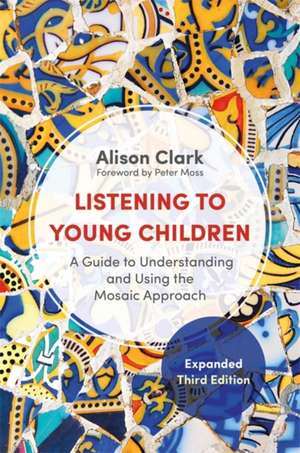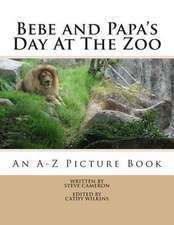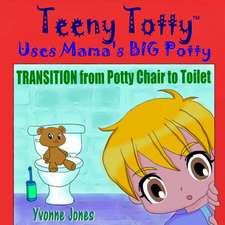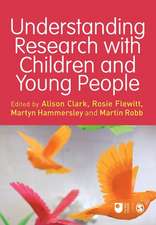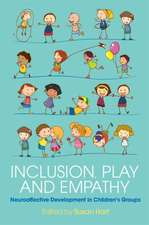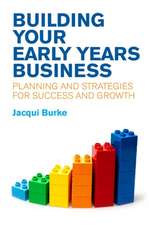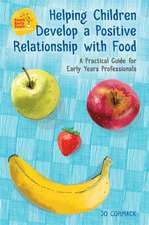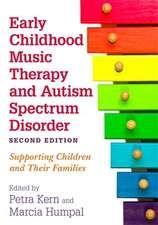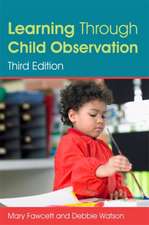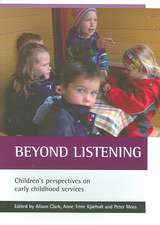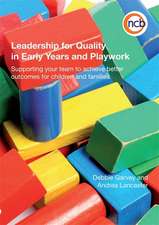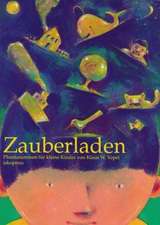Listening to Young Children, Expanded Third Edition
Autor Alison Clarken Limba Engleză Paperback – 21 iun 2017
Combining the authors' successful books Listening to Young Children and Spaces to Play into an expanded and fully updated third edition, this book builds on the authors' original ground-breaking work by commenting on the development and adaptation of the Mosaic approach, along with case studies of the Mosaic approach in action in four countries: England, Denmark, Norway and Australia. Alongside guidance on using and adapting the framework with young children, older children and adults, there is new material on the ethical and methodological issues involved.
Preț: 152.26 lei
Preț vechi: 185.49 lei
-18% Nou
Puncte Express: 228
Preț estimativ în valută:
29.14€ • 30.10$ • 24.25£
29.14€ • 30.10$ • 24.25£
Carte disponibilă
Livrare economică 05-19 martie
Livrare express 18-22 februarie pentru 55.33 lei
Preluare comenzi: 021 569.72.76
Specificații
ISBN-13: 9781909391222
ISBN-10: 1909391220
Pagini: 192
Ilustrații: 13 photos, 4 graphics
Dimensiuni: 152 x 228 x 14 mm
Greutate: 0.29 kg
Ediția:3 Revised edition
Editura: JESSICA KINGSLEY PUBLISHERS
ISBN-10: 1909391220
Pagini: 192
Ilustrații: 13 photos, 4 graphics
Dimensiuni: 152 x 228 x 14 mm
Greutate: 0.29 kg
Ediția:3 Revised edition
Editura: JESSICA KINGSLEY PUBLISHERS
Cuprins
Foreword - Peter Moss, Emeritus Professor of Early Childhood Provision at the Institute of Education, University of London; Preface to the third edition;1. A framework for listening - Introduction. Starting points. The framework for listening; Reflective questions; 2. Listening to Young children: developing the Mosaic approach - Introduction. Stage One: children and adults gathering documentation. Observation. Interviews with children. Children's photographs. Tour. Map making. Role play. Parents' perspectives. Practitioners' perspectives. Researcher's perspectives. Stage Two: Piecing together information for dialogue. Reflection and interpretation. Bringing the mosaic together. Pre-verbal children. Children with speech. Reflection into practice. Recognising the unexpected. Mosaic approach with refugee children; 3. Spaces to Play: adapting the Mosaic approach - Introduction. Stage One: gathering children's and adults' perspectives. Observation. Children's photographs and book-making. Child-led tours. Map making. Magic carpet. Interviews with children. Interviews with practitioners. Interviews with parents. Stage Two: discussing the material. Reviews with children. Reviews with practitioners. Stage Three: deciding areas of continuity and change. Places to keep: the 'caterpillar'. Places to expand: the house. Places to changes: the fence. Places to add: seating and digging. Evaluation. Changes into practice. Discussion. Reflective questions. 4. Case studies: working with the Mosaic approach - Introduction. Case Study One, UK. Case Study Two, Denmark. Case Study Three, Norway. Case Study Four, Australia. Discussion,; Chapter 5: Ethical and methodological questions - Introduction. Questions. Conclusion; Epilogue; Appendix: Further reading about the Mosaic approach and schedules ; References; Index
Descriere
This fully updated expanded book explains how to use the Mosaic approach, a practice that instils the importance of listening to children's life experiences. It shows how to use it in a variety of settings, outlines the future directions of the approach, offers case studies and also covers working with vulnerable children.
